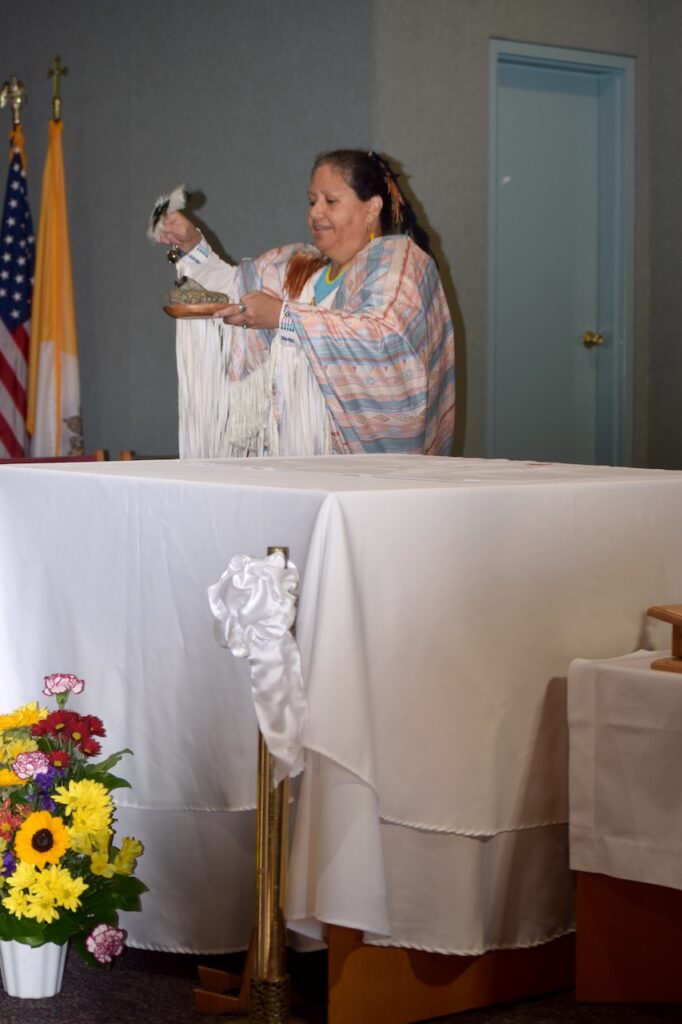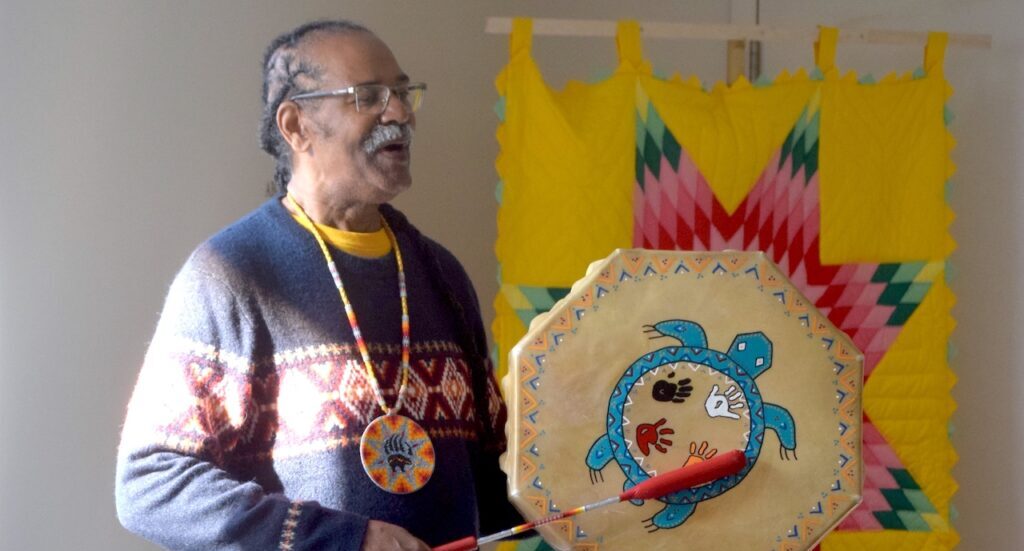With a smudging ceremony, songs and stories, the annual diocesan Native American Retreat Nov. 18 at St. Jerome in Newport News was a celebration of the rich culture of the Indigenous peoples of America. It was also an informative time as Deacon Larry Deschaine of the Diocese of Charleston, South Carolina, drew parallels between Native American spirituality and Catholicism.
Before and during the opening Mass at the retreat, DJ “Silverlake” Bradley smudged with sage the worship space and people in it as a spiritual cleansing and blessing. Smudging ceremonies are common rituals among Indigenous peoples as a way to purify and bless things. Bradley, a member of the Basilica of St. Mary of the Immaculate Conception in Norfolk, is a descendent of the Narragansett and Kuna tribes.
(In 2002, Pope St. John Paul II presided over a Mass in Mexico City that opened with a smudging ceremony. “Without regarding one’s ancestral customs as myths, one can reach God without renouncing one’s own culture but letting oneself be enlightened by the light of Christ, which renews the religious spirit of the best popular traditions,” he said.)
Vincent Kevin Jones, also a basilica parishioner of Native American descent, opened the meeting portion of the retreat with a traditional Ojibwe song in which he asked an eagle to fly to the Lord, tell him something important was about to happen and invite him to the event. Following that, he sang the names of the tribal nations of Virginia.
‘Embrace their story’
Daniel Villar, director of the diocese’s Office of Ethnic Ministries, which offered the event, said because Native American cultures use narrative and stories to pass down their history and traditions, a purpose of the retreat was “to help people know their story, embrace their story and tell their story.”
“We’re hoping this prompts those who attend to be the gatekeepers of their stories,” he said.
To that end, Roy “Running Deer” York, a member of St. Martin of Tours Parish on Fort Gregg-Adams, shared Native American narratives. In one story, York, who is of Shawnee-Myaamia descent, said a Cherokee grandfather told his grandson that two wolves fight inside of each person. One wolf is evil and brings anger, envy, regret, arrogance, despair, lies and hatred for others. The other wolf is good and brings with him joy, peace, humility, kindness, truthfulness, faith and a true love for others. The wolf that will win will be the wolf that one feeds.
He also read the death song of Tecumseh, a Shawnee chief and warrior.
“One’s Native American death song reflects their beliefs and actions and what led them to be and achieve, a song of life for one’s grandchildren, all within Creator’s eyes,” York said.
Tecumseh’s song directs people on how to live, including advice on respecting others in their views, demanding they respect yours, serving your people, being thankful, abusing no one and no thing – and how to be unafraid of death but rather to “sing your death song and die like a hero going home.”
York also passed down a personal story. After a doctor told him that his daughter, one of York’s nine children, had died in an accident, he went to the car and saw a shooting star “go from horizon to horizon.” He saw the same when his mother-in-law died years later.
Alfie Martinez-Coyle, pastoral associate for the Hispanic community at St. Bede in Williamsburg, explained how Native American customs were practiced in her family. Coyle, who has applied for entry in the Tap Pilam Coahuiltecan Nation, said that when she was growing up, the women would gather together to make a star quilt for big events like weddings. As the women sewed, they would pass down stories. Her grandmothers told her the star quilt was the eye of God and he would take care of you in your life, envelope you in warmth and give you many more generations to come.
She said another tradition was to hold vigils when a loved one was dying. For example, when her mother was “transitioning to her next journey,” family and friends gathered in the house with her where they prayed the rosary and told stories about her. Coyle and her sisters continued sharing those memories as they prepared their mother for the funeral – cleansing her, dressing her and doing her makeup.
‘Not a competition’
Deacon Deschaine, who is a descendant of multiple tribes, explained how Native American spirituality and Catholicism have “a lot of ties” as they both value living “peacefully with God, neighbor and our environment.”
He said that Pope Francis’ encyclical “Fratelli Tutti: On Fraternity and Social Friendship” and Native American writings are virtually the same, and he said that Pope Francis’ encyclical “Laudato Si’: On Care for Our Common Home” echoes Native American values so closely that Pope Francis wrote in it that the Indigenous people have a strong sense of community, a readiness to protect others, a spirit of creativity and a deep love for the land.

“These are the gifts that we bring,” said Deacon Deschaine.
Another similarity, he said, is between the seven gifts of the Holy Spirit and the seven Grandfather Teachings which are virtues taught to Native American children from an early age. The virtues of the Grandfather Teachings are humility, courage, respect, love, honesty, truth and wisdom. The seven gifts of the Holy Spirit are wisdom, understanding, counsel, fortitude, knowledge, piety and fear of the Lord.
He explained that some Native American customs align with Catholic practices. For example, the Sacred Breadth, a morning meditation, “connects one to all of creation.” He explained that during the Tobacco Offering, tobacco or incense is wrapped in a cotton cloth to represent a string of prayers of gratitude. It is then buried or burned as the Native Americans watch the smoke rise, carrying their prayers to the Creator. In some penance and thanksgiving Masses, he said, people write their petitions and then burn them along with incense.
As Deacon Deschaine detailed other similarities between Native American and Catholic teachings and practices, he said, “It’s not a competition. It’s enjoying our lives as Catholics and Native Americans.”
“We don’t give things up because we’re Catholic. We flower them out,” he said. “There was a time years ago where we weren’t allowed to express our traditions in the spirit and manner that we are now today. Take advantage of this freedom to become who God meant us to be as Native American Catholics.”

